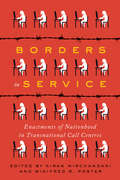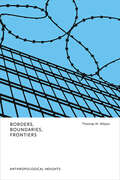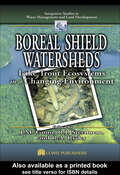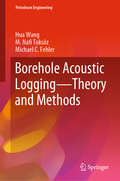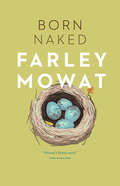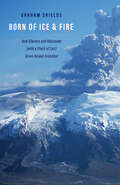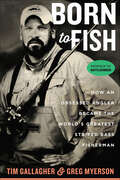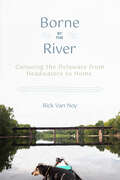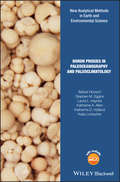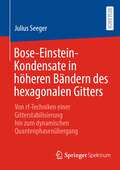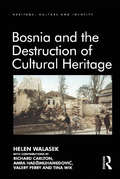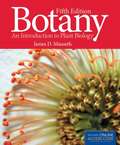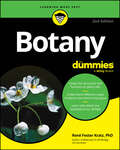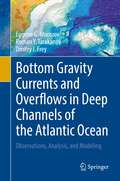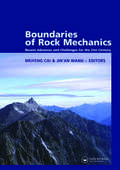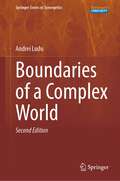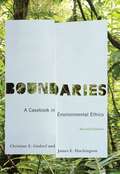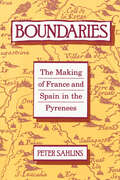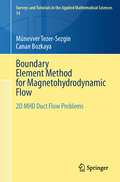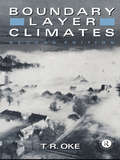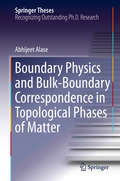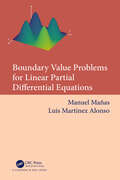- Table View
- List View
Borders in Service: Enactments of Nationhood in Transnational Call Centres
by Kiran Mirchandani Winifred PosterBorders in Service traces the intersection of service labour and national identity across global call centres in seven countries: El Salvador, Guatemala, Guyana, Mauritius, Morocco, the Philippines, and the US-Mexico border. While most studies on offshore call centres have focused on India this collection explores the experiences of call center workers in many of the newly emerging hubs of transnational service work. In this collection, Kiran Mirchandani and Winifred Poster have gathered a wide range of contributors to explore the dynamics within global call centres. Such dynamics include: language, speech, accent issues, expressions of consumer sentiment, physical space, and organizational, human resource, and labour policies. By grounding the theoretical debates on nationhood and labour in the realities of daily life in global call centres, Mirchandani and Poster have created a timely, accessible and revealing collection that will change what we know about offshored customer service work.
Borders, Boundaries, Frontiers: Anthropological Insights (Anthropological Insights)
by Thomas M. WilsonInternational borders are among the most significant political inventions of modern times. The borders between national states are not just important to the peoples and governments who face each other across the borderline – any international border can become a regional hotspot of global concern. But aside from the significant role borders play in national and international affairs, borders are also places and spaces where people live, work, raise families, and build businesses. Written for students across disciplines, Borders, Boundaries, Frontiers introduces readers to the study of borders and border cultures. Thomas M. Wilson examines both historical foundations and current developments in the field, with an emphasis on anthropological contributions. Ultimately, Borders, Boundaries, Frontiers encourages students to explore the role anthropology plays in the understanding of contemporary borders.
Boreal Forests in the Face of Climate Change: Sustainable Management (Advances in Global Change Research #74)
by Yves Bergeron Miguel Montoro Girona Hubert Morin Sylvie GauthierThis open access book explores a new conceptual framework for the sustainable management of the boreal forest in the face of climate change. The boreal forest is the second-largest terrestrial biome on Earth and covers a 14 million km2 belt, representing about 25% of the Earth’s forest area. Two-thirds of this forest biome is managed and supplies 37% of global wood production. These forests also provide a range of natural resources and ecosystem services essential to humanity. However, climate change is altering species distributions, natural disturbance regimes, and forest ecosystem structure and functioning. Although sustainable management is the main goal across the boreal biome, a novel framework is required to adapt forest strategies and practices to climate change. This collaborative effort draws upon 148 authors in summarizing the sustainable management of these forests and detailing the most recent experimental and observational results collected from across the boreal biome. It presents the state of sustainable management in boreal forests and highlights the critical importance of this biome in a context of global change because of these forests' key role in a range of natural processes, including carbon sequestration, nutrient cycling, and the maintaining of biodiversity. This book is an essential read for academics, students, and practitioners involved in boreal forest management. It outlines the challenges facing sustainable boreal forest management within the context of climate change and serves as a basis for establishing new research avenues, identifying future research trends, and developing climate-adapted forest management plans.
Boreal Shield Watersheds: Lake Trout Ecosystems in a Changing Environment
by J. M. Gunn R. J. Steedman R. A. RyderBoreal Shield Watersheds: Lake Trout Ecosystems in a Changing Environment brings together the work of a renowned international group of scientists who specialize in aquatic science and environmental management. They explore the functioning of Boreal Shield ecosystems, focusing on the lake trout, the classic coldwater species of northern glaciated l
Borehole Acoustic Logging – Theory and Methods (Petroleum Engineering)
by Hua Wang M. Nafi Toksöz Michael C FehlerThis book covers the principles, historical development, and applications of many acoustic logging methods, including acoustic logging-while-drilling and cased-hole logging methods. Benefiting from the rapid development of information technology, the subsurface energy resource industry is moving toward data integration to increase the efficiency of decision making through the use of advanced big data and artificial intelligence technologies, such as machine/deep learning. However, wellbore failure may happen if evaluations of risk and infrastructure are made using data mining methods without a complete understanding of the physics of borehole measurements. Processed results from borehole acoustic logging will constitute part of the input data used for data integration. Therefore, to successfully employ modern techniques for data assimilation and analysis, one must fully understand the complexity of wave mode propagation, how such propagation is influenced by the well, and the materials placed within the well (i.e., the cement, casing, and drill strings), and ultimately how waves penetrate into and are influenced by geological formations. State-of-the-art simulation methods, such as the discrete wavenumber integration method (DWM) and the finite difference method (FDM), are introduced to tackle the numerical challenges associated with models containing large material contrasts, such as the contrasts between borehole fluids and steel casings. Waveforms and pressure snapshots are shown to help the reader understand the wavefields under various conditions. Advanced data processing methods, including velocity analyses within the time and frequency domains, are utilized to extract the velocities of different modes. Furthermore, the authors discuss how various formation parameters influence the waveforms recorded in the borehole and describe the principles of both existing and potential tool designs and data acquisition schemes. This book greatly benefits from the research and knowledge generated over four decades at the Earth Resources Laboratory (ERL) of the Massachusetts Institute of Technology (MIT) under its acoustic logging program. Given its scope, the book is of interest to geophysicists (including borehole geophysicists and seismologists), petrophysicists, and petroleum engineers who are interested in formation evaluation and cementation conditions. In addition, this book is of interest to researchers in the acoustic sciences and to 4th-year undergraduate and postgraduate students in the areas of geophysics and acoustical physics.
Born Naked
by Farley MowatFarley Mowat's outrageous memoir begins with his unlikely conception in a canoe and continues to his boyhood fascination with creatures of the natural world and on to his youthful rambles and adventures. To his immense pleasure and his parents' dismay, he adopted various beasts (whom he affectionately calls "The Others") as roomates. In this boyhood memoir, he recounts the exploits of this second family, who have been the subjects of many of his beloved books for young readers. This is the tale of a mischievous, immensely gifted young naturalist, recounted with the wisdom, humour and grown-up perspective of a very talented writer.
Born Naked
by Farley MowatFarley Mowat's outrageous memoir begins with his unlikely conception in a canoe and continues to his boyhood fascination with creatures of the natural world and on to his youthful rambles and adventures. To his immense pleasure and his parents' dismay, he adopted various beasts (whom he affectionately calls "The Others") as roomates. In this boyhood memoir, he recounts the exploits of this second family, who have been the subjects of many of his beloved books for young readers. This is the tale of a mischievous, immensely gifted young naturalist, recounted with the wisdom, humour and grown-up perspective of a very talented writer.
Born of Ice and Fire: How Glaciers and Volcanoes (with a Pinch of Salt) Drove Animal Evolution
by Graham ShieldsAn exploration of how the Cryogenian Period, when our planet was covered in ice for millions of years, created today&’s remarkable biodiversity More than half a billion years ago, our world was completely covered by glaciers, a &“Snowball Earth&” that persisted for millions of years. Incredibly, this unimaginable cold led to the remarkable diversification of life on earth known as the Cambrian explosion. With a geologist&’s eye and a knack for storytelling, Graham Shields explores when and how such inhospitable conditions enabled animals to evolve, radiate, and diversify into our earliest ancestors. This journey navigates the wild swings between hot and cold climates, oxygenation and asphyxiation, biological radiations and extinctions, asking how such instability relates to grander forces that brought our planet to its modern state. Shields guides readers through evidence found in the Australian outback, Mongolia, Scotland, and other locales, revealing how geologists can trace glaciation, the atmosphere, oceans, mountain building, and more through the earth&’s rocks, providing a comprehensive theory of how life evolved and diversified.
Born to Fish: How an Obsessed Angler Became the World's Greatest Striped Bass Fisherman
by Tim Gallagher Greg MyersonFrom RattleSinker inventor Grey Myerson, "an extraordinary story of one man's obsession, a tale of passion, brutality, tragedy, and redemption...a book about a love of fishing that tackles the deepest themes of life" (Helen Macdonald, author of H is for Hawk).Born to Fish tells the tale of a man who led a harrowing, sometimes dissolute life until he turned himself around, thanks to his rod and reel. Overcoming learning disabilities, substance abuse, and the violence associated with a father in the mob, Greg Myerson, a lifelong sport-fisherman, caught an 82-pound striped bass in 2011, shattering a world record that had stood for 29 years. Without any training in biological research, he began studying the striped bass like a scientist—examining how it hunts, the food it eats, how its behavior is affected by moon phases and the cycles of the tides—which led to the creation of the RattleSinker, the lure that helped him catch the record-setting bass. During an appearance on the TV show Shark Tank, Mark Cuban bought a 33 percent share of Greg's company, World Record Striper Company. Yet at the very instant he achieved his crowning glory as a striped bass fisherman, he had a staggering epiphany and instantly regretted killing the fish. Greg is now at the forefront of the effort to save the big striped bass, the most prolific breeders, and actively promotes no-kill catch-and-release tournaments.
Borne by the River: Canoeing the Delaware from Headwaters to Home
by Rick Van NoyAfter a near-fatal stroke and a separation, amidst a global pandemic, Rick Van Noy decided to go for a paddle. In Borne by the River, he charts the story of discovery, and healing that came from this solo canoe journey. Paddling two hundred miles on the Delaware River to his boyhood home just upriver from Trenton, New Jersey, Van Noy contemplates his fate and life, as well as the simple joy of sitting in a small boat floating down a large river with his dog, Sully.Deftly combining memoir, natural and local history, and engaging reportage of his encounters with other paddlers and river enthusiasts, including members of the Lenape Nation of Pennsylvania, Van Noy reveals deep and shifting layers of environmental, historical, cultural, and personal significance of the Delaware. Borne by the River reckons with the way that rivers braid into one's own life—thrilling rapids, eddying pauses, and life-changing rifts and falls. Van Noy rediscovers and shares how river journeys can scatter anxieties, wash away regrets, and recreate the spirit in its free-flowing currents.
Boron Proxies in Paleoceanography and Paleoclimatology (Analytical Methods in Earth and Environmental Science)
by Barbel Hoenisch Stephen M. Eggins Laura L. Haynes Katherine A. Allen Katherine D. Holland Katja LorbacherAnthropogenic carbon dioxide emissions do not only warm our planet but also acidify our oceans. It is currently unclear to which degree Earth’s climate and marine life will be impacted by these changes but information from Earth history, particularly the geochemical signals of past environmental changes stored in the fossil remains of marine organisms, can help us predict possible future changes. This book aims to be a primer for scientists who seek to apply boron proxies in marine carbonates to estimate past seawater carbonate chemistry and atmospheric pCO2. Boron proxies (δ11B and B/Ca) were introduced nearly three decades ago, with subsequent strides being made in understanding their mechanistic functioning. This text reviews current knowledge about the aqueous systematics, the inorganic and biological controls on boron isotope fractionation and incorporation into marine carbonates, as well as the analytical techniques for measurement of boron proxies. Laboratory and field calibrations of the boron proxies are summarized, and similarities between modern calibrations are explored to suggest estimates for proxy sensitivities in marine calcifiers that are now extinct. Example applications illustrate the potential for reconstructing paleo-atmospheric pCO2 from boron isotopes. Also explored are the sensitivity of paleo-ocean acidity and pCO2 reconstructions to boron isotope proxy systematics that are currently less well understood, including the elemental and boron isotopic composition of seawater through time, seawater alkalinity, temperature and salinity, and their collective impact on the uncertainty of paleo-reconstructions. The B/Ca proxy is based on the same mechanistic principles as the boron isotope proxy, but empirical calibrations suggest seawater pH is not the only controlling factor. B/Ca therefore has the potential to provide a second carbonate parameter that could be paired with δ11B to fully constrain the ocean carbonate system, but the associated uncertainties are large. This text reviews and examines what is currently known about the B/Ca proxy systematics. As more scientists embark on characterizing past ocean acidity and atmospheric pCO2, Boron in Paleoceanography and Paleoclimatology provides a resource to introduce geoscientists to the opportunities and complications of boron proxies, including potential avenues to further refine them.
Bose-Einstein-Kondensate in höheren Bändern des hexagonalen Gitters: Von rf-Techniken einer Gitterstabilisierung hin zum dynamischen Quantenphasenübergang
by Julius SeegerDieses Buch beschreibt die erstmalige, erfolgreiche Realisierung unkonventioneller Superfluide in höheren Bändern des hexagonalen optischen Gitters. Der Populationstransfer und der anschließende dynamische Quantenphasenübergang werden ausführlich diskutiert. Schließlich werden die Metastabilität und Zerfallskanäle des ultrakalten Systems experimentell nachgewiesen. Durch die Reduktion von Phasenrauschen des optischen Gitters konnte die Lebensdauer des ultrakalten Ensembles um etwa eine Größenordnung erhöht werden. Weiterhin werden die optische Phasenregelschleife und Intensitätsstabilisierung des Gitters vorgestellt. Mit den in diesem Buch beschriebenen Ergebnissen und technologischen Entwicklungen werden die derzeit bestehenden Grenzen der Quantensimulation mittels ultrakalter Gase in optischen Gittern aufgehoben und der Weg für zahlreiche nachfolgende Untersuchungen bereitet.
Bosnia and the Destruction of Cultural Heritage (Heritage, Culture and Identity)
by Valery Perry Helen Walasek contributions by Carlton Amra Hadžimuhamedović Tina WikThe massive intentional destruction of cultural heritage during the 1992-1995 Bosnian War targeting a historically diverse identity provoked global condemnation and became a seminal marker in the discourse on cultural heritage. It prompted an urgent reassessment of how cultural property could be protected in times of conflict and led to a more definitive recognition in international humanitarian law that destruction of a people's cultural heritage is an aspect of genocide. Yet surprisingly little has been published on the subject. This wide-ranging book provides the first comprehensive overview and critical analysis of the destruction of Bosnia-Herzegovina's cultural heritage and its far-reaching impact. Scrutinizing the responses of the international community during the war (including bodies like UNESCO and the Council of Europe), the volume also analyses how, after the conflict ended, external agendas impinged on heritage reconstruction to the detriment of the broader peace process and refugee return. It assesses implementation of Annex 8 of the Dayton Peace Agreement, a unique attempt to address the devastation to Bosnia's cultural heritage, and examines the treatment of war crimes involving cultural property at the International Criminal Tribunal for the former Yugoslavia (ICTY). With numerous case studies and plentiful illustrations, this important volume considers questions which have moved to the foreground with the inclusion of cultural heritage preservation in discussions of the right to culture in human rights discourse and as a vital element of post-conflict and development aid.
Botany (5th Edition)
by James D. MausethAs new information is introduced and environmental changes occur, Plant Biology continues to develop and evolve as a science. Updated and revised to keep pace with these developments, the Fifth Edition of Botany: An Introduction to Plant Biology provides a modern and comprehensive overview of the fundamentals of botany while retaining the important focus of natural selection, analysis of botanical phenomena, and diversity. Students are first introduced to topics that should be most familiar (plant structure), proceed to those less familiar (plant physiology and development), and conclude with topics that are likely least familiar to the introductory student (genetics, evolution, and ecology). Mauseth is sure to provide the latest material on molecular biology and plant biotechnology in an effort to keep pace with these advancing areas of study. All sections are written to be self-contained allowing for a flexible presentation of course material. Key Features: - Includes new content on molecular biology, plant biotechnology, and the most recent coverage of taxonomy and phylogeny of plants. - Now available with a new electronic laboratory manual. - Plants Do Things Differently boxes help students understand and compare plant biology with human biology. - End-of-chapter study guide includes nearly 50 or more questions in each chapter, urging students to test themselves on the most important points in the chapter. - Alternatives boxes encourage students to think expansively about alternative aspects of plant biology that are more advantageous in certain conditions.
Botany For Dummies
by Rene Fester KratzHarvest basic botany knowledge from this abundant book Botany For Dummies gives you a thorough overview of the fundamentals of botany, but in simple terms that anyone can understand. Great for supplementing your botany coursework or brushing up before an exam, this book covers plant evolution, the structure and function of plant cells, and plant identification. Plus, you'll learn about how plants of different types are changing and adapting in response to changing climates. This new edition goes into more detail on fungi—not technically plants, but no one is holding that against them. Regardless of what brought you to the wonderful world of botany, this book will show you around. Get an easy-to-understand introduction to the key concepts in botany Read about recent discoveries and theories in the world of plant science Understand different families of plants and where they grow Improve your grade and pass your exam in your introductory botany course Get a copy of Botany For Dummies and watch your botany knowledge bloom.
Bottom Gravity Currents and Overflows in Deep Channels of the Atlantic Ocean: Observations, Analysis, and Modeling
by Eugene G. Morozov Roman Y. Tarakanov Dmitry I. FreyThis book is dedicated to the analysis of bottom waters flows through underwater channels of the Atlantic Ocean. The study is based on recent observations of the authors, analysis of historical data, numerical modeling, and literature review. For example, studying both the measurements from the World Ocean Circulation experiment in the 1990s and recent measurements reveals the decadal variations of water properties in the ocean.Seawater is cooled at high latitudes, descends to the ocean bottom, and slowly flows to the tropical latitudes and further. This current is slow in the deep basins, but intensifies in the abyssal channels connecting the basins. The current overflows submarine topographic structures and sometimes forms deep cataracts when water descends over slopes by several hundred meters. The flow of Antarctic Bottom Water (AABW) is studied on the basis of CTD sections combined with Lowered Acoustic Doppler Profiling (LADCP) carried out annually, and long-term moored measurements of currents. This book is a collection of oceanographic data, interpretation, and analysis, which can be used by field oceanographers, specialists in numerical modeling, and students who specialize in oceanography.
Boundaries of Rock Mechanics: Recent Advances and Challenges for the 21st Century
by Meifeng Cai Jin’an WangBoundaries of Rock Mechanics. Recent Advances and Challenges for the 21st Century contains 180 papers from the International Young Scholars Symposium on Rock Mechanics 2008 (Beijing, China, 28 April-2 May 2008). The symposium was organized by the ISRM Commission on Education, and sponsored by the International Society for Rock Mechanics (ISRM) and
Boundaries of a Complex World (Springer Series in Synergetics)
by Andrei LuduThe 2nd edition of this book provides novel topics and studyies in boundaries of networks and Big Data Systems.The central theme of this book is the extent to which the structure of the free dynamical boundaries of a system controls the evolution of the system as a whole. Applying three orthogonal types of thinking - mathematical, constructivist and morphological, it illustrates these concepts using applications to selected problems from the social and life sciences, as well as economics. In a broader context, it introduces and reviews some modern mathematical approaches to the science of complex systems. Standard modeling approaches (based on non-linear differential equations, dynamic systems, graph theory, cellular automata, stochastic processes, or information theory) are suitable for studying local problems. However they cannot simultaneously take into account all the different facets and phenomena of a complex system, and new approaches are required to solve the challenging problem of correlations between phenomena at different levels and hierarchies, their self-organization and memory-evolutive aspects, the growth of additional structures and are ultimately required to explain why and how such complex systems can display both robustness and flexibility. This graduate-level text addresses a broader interdisciplinary audience, keeping the mathematical level essentially uniform throughout the book, and involving only basic elements from calculus, algebra, geometry and systems theory.
Boundaries: A Casebook in Environmental Ethics
by Christine E. Gudorf James Edward HuchingsonIn this expanded and revised edition of a fresh and original case-study textbook on environmental ethics, Christine Gudorf and James Huchingson continue to explore the line that separates the current state of the environment from what it should be in the future. <p> Boundaries begins with a lucid overview of the field, highlighting the key developments and theories in the environmental movement. Specific cases offer a rich and diverse range of situations from around the globe, from saving the forests of Java and the use of pesticides in developing countries to restoring degraded ecosystems in Nebraska. With an emphasis on the concrete circumstances of particular localities, the studies continue to focus on the dilemmas and struggles of individuals and communities who face daunting decisions with serious consequences. This second edition features extensive updates and revisions, along with four new cases: one on water privatization, one on governmental efforts to mitigate global climate change, and two on the obstacles that teachers of environmental ethics encounter in the classroom. Boundaries also includes an appendix for teachers that describes how to use the cases in the classroom.
Boundaries: The Making of France and Spain in the Pyrenees
by Peter SahlinsThis book is an account of two dimension of state and nation building in France and Spain since the seventeenth century--the invention of a national boundary line and the making of Frenchmen and Spaniards. It is also a history of Catalan rural society in the Cerdanya, a valley in the eastern Pyrenees divided between Spain and France in 1659. This study shuttles between two levels, between the center and the periphery. It connects the "macroscopic" political and diplomatic history of France and Spain, from the Old Regime monarchies to the national territorial states of the later nineteenth century; and the "molecular" history--the historical ethnography--of Catalan village communities, rural nobles, and peasants in the borderland. On the frontier, these two histories come together, and they can be told as one.
Boundary Conformal Field Theory and the Worldsheet Approach to D-Branes
by Aptara. Inc Andreas RecknagelBoundary conformal field theory is concerned with a class of two-dimensional quantum field theories which display a rich mathematical structure and have many applications ranging from string theory to condensed matter physics. In particular, the framework allows discussion of strings and branes directly at the quantum level. Written by internationally renowned experts, this comprehensive introduction to boundary conformal field theory reaches from theoretical foundations to recent developments, with an emphasis on the algebraic treatment of string backgrounds. Topics covered include basic concepts in conformal field theory with and without boundaries, the mathematical description of strings and D-branes, and the geometry of strongly curved spacetime. The book offers insights into string geometry that go beyond classical notions. Describing the theory from basic concepts, and providing numerous worked examples from conformal field theory and string theory, this reference is of interest to graduate students and researchers in physics and mathematics.
Boundary Element Method for Magnetohydrodynamic Flow: 2D MHD Duct Flow Problems (Surveys and Tutorials in the Applied Mathematical Sciences #14)
by Münevver Tezer-Sezgin Canan BozkayaBoundary Element Method for Magnetohydrodynamic Flow” offers one of the first systematic and detailed treatments of the application of boundary element method (BEM) to magnetohydrodynamic (MHD) flow problems. It aims to fill in the gaps left by the earlier books on the application of BEM to some physical problems such as fluid dynamics, elasticity, and geophysics. An overview of the theory of MHD flow and a comprehensive mathematical formulation of BEM for convection-diffusion-type differential equations are provided by the authors, who heavily rely on their research and experience in the disciplines of BEM and MHD flow. The book first discusses the basic principles of the BEM approach for the MHD duct flow problems in coupled form with the fundamental solution derived by the authors. Specifically, the BEM solutions of MHD flow in pipes of rectangular or circular cross-sections, and MHD flow in infinite regions, are all covered emphasizing the convergence of infinite boundary integrals. This book, especially, concentrates on the MHD flow in regions with partly insulated partly perfectly conducting boundaries by BEM giving also the parabolic boundary layer thickness emanating from the points of discontinuities on the walls. The book secondly includes the dual reciprocity boundary element technique (DRBEM), an alternative form of BEM that expands the applicability of BEM to MHD flow and heat transfer problems as well as buoyancy MHD flow with magnetic potential and inductionless MHD flow. The purpose of the book is to serve as a research book for applied mathematicians, engineers, scientists, and graduate students who wish to learn in-depth about the formulation and application of BEM in MHD flow problems. As such, it is an invaluable resource and a major contribution to the numerical solution of MHD flow problems.
Boundary Layer Climates
by T. R. OkeThis modern climatology textbook explains those climates formed near the ground in terms of the cycling of energy and mass through systems.
Boundary Physics and Bulk-Boundary Correspondence in Topological Phases of Matter (Springer Theses)
by Abhijeet AlaseThis thesis extends our understanding of systems of independent electrons by developing a generalization of Bloch’s Theorem which is applicable whenever translational symmetry is broken solely due to arbitrary boundary conditions. The thesis begins with a historical overview of topological condensed matter physics, placing the work in context, before introducing the generalized form of Bloch's Theorem. A cornerstone of electronic band structure and transport theory in crystalline matter, Bloch's Theorem is generalized via a reformulation of the diagonalization problem in terms of corner-modified block-Toeplitz matrices and, physically, by allowing the crystal momentum to take complex values. This formulation provides exact expressions for all the energy eigenvalues and eigenstates of the single-particle Hamiltonian. By precisely capturing the interplay between bulk and boundary properties, this affords an exact analysis of several prototypical models relevant to symmetry-protected topological phases of matter, including a characterization of zero-energy localized boundary excitations in both topological insulators and superconductors. Notably, in combination with suitable matrix factorization techniques, the generalized Bloch Hamiltonian is also shown to provide a natural starting point for a unified derivation of bulk-boundary correspondence for all symmetry classes in one dimension.
Boundary Value Problems for Linear Partial Differential Equations
by Manuel Mañas Luis Martínez AlonsoBoundary value problems play a significant role in modeling systems characterized by established conditions at their boundaries. On the other hand, initial value problems hold paramount importance in comprehending dynamic processes and foreseeing future behaviors. The fusion of these two types of problems yields profound insights into the intricacies of the conduct exhibited by many physical and mathematical systems regulated by linear partial differential equations.Boundary Value Problems for Linear Partial Differential Equations provides students with the opportunity to understand and exercise the benefits of this fusion, equipping them with realistic, practical tools to study solvable linear models of electromagnetism, fluid dynamics, geophysics, optics, thermodynamics and specifically, quantum mechanics. Emphasis is devoted to motivating the use of these methods by means of concrete examples taken from physical models. Features No prerequisites apart from knowledge of differential and integral calculus and ordinary differential equations. Provides students with practical tools and applications Contains numerous examples and exercises to help readers understand the concepts discussed in the book.
